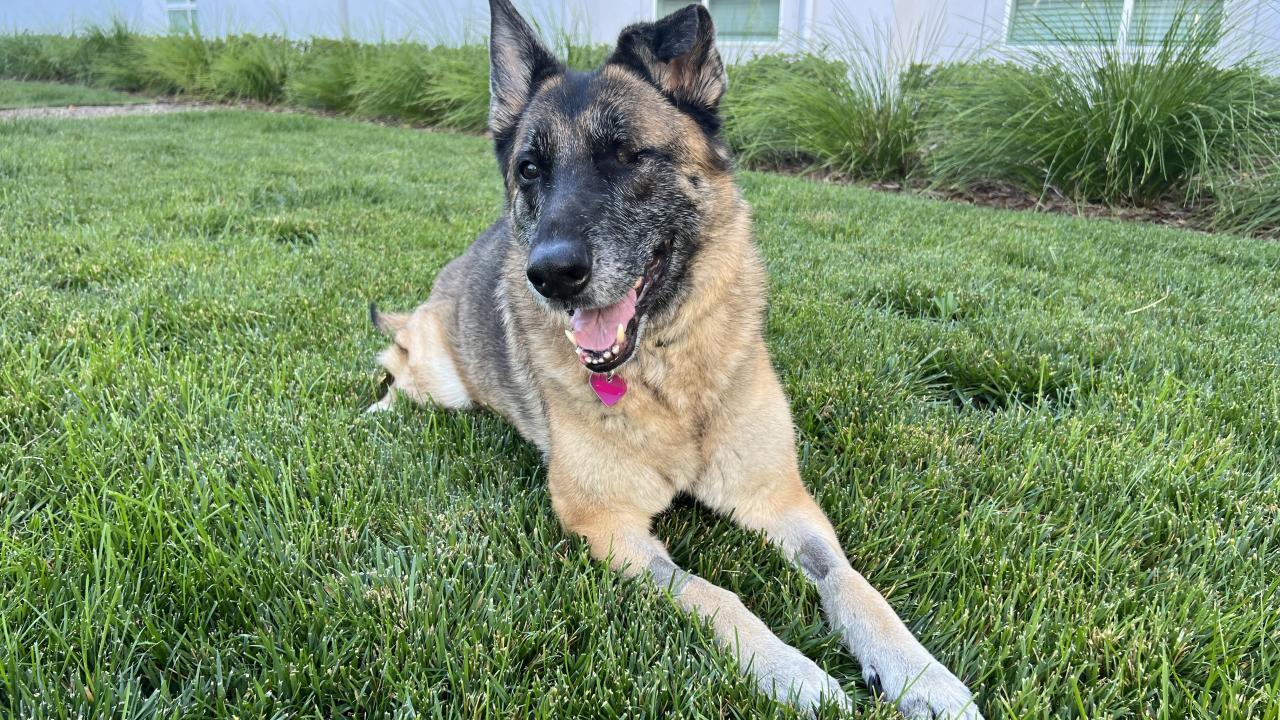
Dog with Fungal Infection Beats Overwhelming Odds
Collaborative efforts among multiple specialty services and dedicated owners lead to heroic results
“Case of the Month” – September 2024
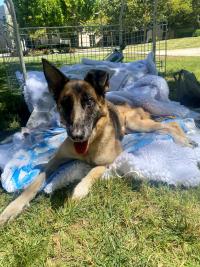
Dog owners Anthony Lan and his partner Elora Paule must have heard the terms “grave prognosis” and “consider euthanasia” from half a dozen veterinarians. Their dog Riley, a 7-year-old female German shepherd, was battling a condition with nearly a 0% cure rate. From the very beginning, and throughout the process, they made one thing clear – they were not giving up on their beloved dog.
In the spring of 2023, Lan and Paule noticed Riley had slowed down and was sometimes painful. A veterinarian suggested it was due to age-related joint issues and prescribed anti-inflammatory medication to ease the pain. But that didn’t seem to help.
“Then on a walk one day, I noticed she was markedly slower,” said Paule. “By that afternoon, she lost function of her hind legs.”
Lan and Paule searched for nearly two hours to finally find an emergency room open on a Sunday. There, she was diagnosed with disseminated aspergillosis, a severe and widespread mold infection resulting in discospondylitis (infection of the vertebra and intervertebral discs), kidney infection, and left eye infection. The damage to her vertebra led to instability of her spine and subsequent spinal cord damage and paralysis.
They were told she would most likely not survive and to consider taking her home for one last night.
Lan began researching the condition and found a paper describing another German shepherd in a similar predicament that survived five years with the intervention of a particular antifungal medication. He asked the veterinarians if they had the medication, and if not, where could they get it.
“He said it was available at UC Davis,” Lan commented.
“They told us that if there was any chance of her surviving, we had to take her to UC Davis,” added Paule.
Lan immediately said, “What are we waiting for? Let’s go.”
At the UC Davis veterinary hospital, emergency room veterinarians agreed with the previous clinic’s assessment that Riley’s fungal infection was severe and widespread. The ER specialists consulted with the Neurology/Neurosurgery Service, who performed an MRI which showed the infection led to a compression of her spinal cord resulting in her inability to walk. They deemed she was not a candidate for surgery.
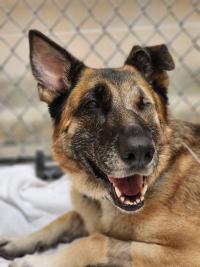
An additional consultation with the Ophthalmology Service concluded that Riley was blind in her left eye and recommended removing it if she survived the fungal infection.
Throughout all of this, Lan and Paule never gave up hope. They were told that Riley was in pain and that her prognosis was poor, but they continued to advocate for her survival.
Her case was transferred to the Internal Medicine Service, where resident Dr. Sarah Michalak worked under the tutelage of faculty with backgrounds in infectious diseases to begin down a long road toward hopefully regaining Riley’s health.
She was hospitalized for a month on two IV antifungal therapies, two oral antifungal therapies, pain medications, fluids, and supportive care.
“We visited her almost every day,” said Paule. “She would get so excited to see us. I think that gave her a lot of willpower to continuing fighting.”
Those daily visits seemed to inspire Riley, and Lan expressed that Riley appeared to give them signals that she wanted to keep fighting for her life.
During hospitalization, Riley’s eye was removed, and a feeding tube was placed to provide nutrition when she was unwilling to eat.
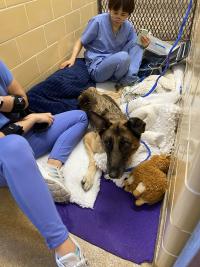
She also started working with rehabilitation specialist Dr. Ronald Koh and resident Dr. Sayaka Shiomitsu in the Integrative Medicine Service. They began with passive modalities like acupuncture and range of motion exercises.
Over the next several months, Riley’s care tapered down to inpatient/outpatient (with weekends home), then to various levels of outpatient care, all the while continuing the antifungal medicine and rehabilitation exercises. The Nutrition Service formulated a home-cooked diet for Riley that was appropriate for her kidney disease. She enjoyed it and started gaining the weight needed to eventually remove her feeding tube.
“We never second guessed anything we had to do throughout the process,” Paule said. “We even moved from a second-floor apartment to one on the first floor to ease getting Riley outside, since our building doesn’t have an elevator.”
Several weeks into the rehabilitation, Riley grew strong enough to move herself with her front legs. Dr. Shiomitsu suggested that she would be a good candidate for a wheelchair, to which Riley adapted with great excitement.
Around this time, Lan and Paule noticed movement in Riley’s hind legs that they hadn’t seen in many weeks.
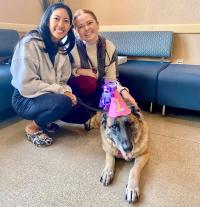
“When we told Dr. Koh, he said to us, ‘We’re going to get her walking again,’” said Paule.
The rehabilitation sessions continued, ultimately working up to assisted walks on the underwater treadmill. Riley continually showed gradual improvements in her mobility and strength. By October 2023, she was able to support herself while standing, and she walked with support. By late November 2023, she was walking on her own and no longer needed the wheelchair.
The antifungal medications worked to ease the compression in her spinal column, and the months of rehabilitation exercises paid off.
“Her vertebra are still not normal, but they have remodeled and stabilized, easing the compromising of her spine,” said Dr. Michalak. “While we’re unlikely to cure Riley of the infection, we’re stopping it in its tracks and keeping it from causing further damage to her vertebra and kidneys.”
Riley will likely stay on the antifungal medication for the rest of her life. But for now, one year out from her initial visit to UC Davis, she appears to be winning the battle.
“Riley truly has an unmatched zest for life, and her joy is an incredible reminder of the power of resilience,” Dr. Michalak said. “And Anthony and Elora were tireless in their pursuit of her health. They took on her care with immense strength and dedication, embraced every challenge that was thrown their way, and helped her beat the odds.”
Lan and Paule report that Riley now has energy and enthusiasm never before displayed.
“She’s like a completely different dog now,” Lan said. “Her personality has changed, and she has different reactions to little things like receiving scratches that we’ve never seen before. It’s like she knew she got a second chance at life.”
# # #
